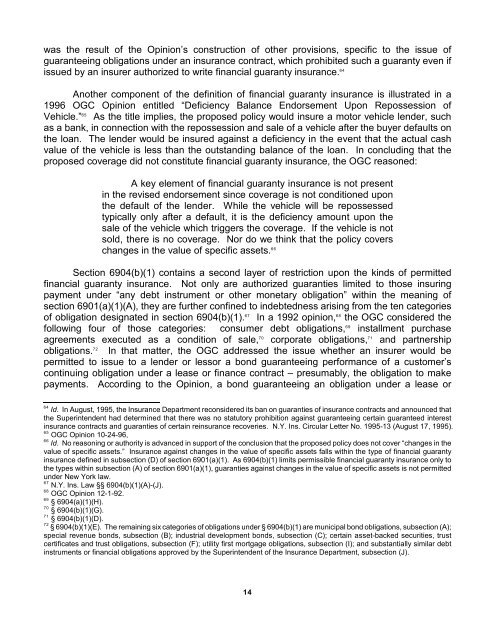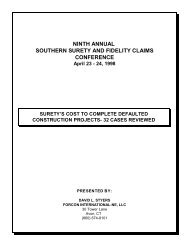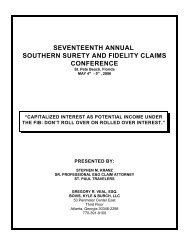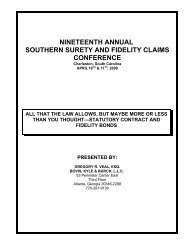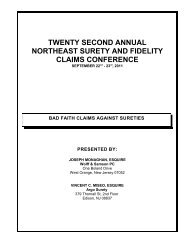financial guaranty bonds and the appleton rule - Forcon International
financial guaranty bonds and the appleton rule - Forcon International
financial guaranty bonds and the appleton rule - Forcon International
Create successful ePaper yourself
Turn your PDF publications into a flip-book with our unique Google optimized e-Paper software.
was <strong>the</strong> result of <strong>the</strong> Opinion’s construction of o<strong>the</strong>r provisions, specific to <strong>the</strong> issue of<br />
guaranteeing obligations under an insurance contract, which prohibited such a <strong>guaranty</strong> even if<br />
issued by an insurer authorized to write <strong>financial</strong> <strong>guaranty</strong> insurance. 64<br />
Ano<strong>the</strong>r component of <strong>the</strong> definition of <strong>financial</strong> <strong>guaranty</strong> insurance is illustrated in a<br />
1996 OGC Opinion entitled “Deficiency Balance Endorsement Upon Repossession of<br />
65 Vehicle.” As <strong>the</strong> title implies, <strong>the</strong> proposed policy would insure a motor vehicle lender, such<br />
as a bank, in connection with <strong>the</strong> repossession <strong>and</strong> sale of a vehicle after <strong>the</strong> buyer defaults on<br />
<strong>the</strong> loan. The lender would be insured against a deficiency in <strong>the</strong> event that <strong>the</strong> actual cash<br />
value of <strong>the</strong> vehicle is less than <strong>the</strong> outst<strong>and</strong>ing balance of <strong>the</strong> loan. In concluding that <strong>the</strong><br />
proposed coverage did not constitute <strong>financial</strong> <strong>guaranty</strong> insurance, <strong>the</strong> OGC reasoned:<br />
64<br />
Id. In August, 1995, <strong>the</strong> Insurance Department reconsidered its ban on guaranties of insurance contracts <strong>and</strong> announced that<br />
<strong>the</strong> Superintendent had determined that <strong>the</strong>re was no statutory prohibition against guaranteeing certain guaranteed interest<br />
insurance contracts <strong>and</strong> guaranties of certain reinsurance recoveries. N.Y. Ins. Circular Letter No. 1995-13 (August 17, 1995).<br />
65<br />
OGC Opinion 10-24-96,<br />
66<br />
Id. No reasoning or authority is advanced in support of <strong>the</strong> conclusion that <strong>the</strong> proposed policy does not cover “changes in <strong>the</strong><br />
value of specific assets.” Insurance against changes in <strong>the</strong> value of specific assets falls within <strong>the</strong> type of <strong>financial</strong> <strong>guaranty</strong><br />
insurance defined in subsection (D) of section 6901(a)(1). As 6904(b)(1) limits permissible <strong>financial</strong> <strong>guaranty</strong> insurance only to<br />
<strong>the</strong> types within subsection (A) of section 6901(a)(1), guaranties against changes in <strong>the</strong> value of specific assets is not permitted<br />
under New York law.<br />
67<br />
N.Y. Ins. Law §§ 6904(b)(1)(A)-(J).<br />
68<br />
OGC Opinion 12-1-92.<br />
69<br />
§ 6904(a)(1)(H).<br />
70<br />
§ 6904(b)(1)(G).<br />
71<br />
§ 6904(b)(1)(D).<br />
72<br />
A key element of <strong>financial</strong> <strong>guaranty</strong> insurance is not present<br />
in <strong>the</strong> revised endorsement since coverage is not conditioned upon<br />
<strong>the</strong> default of <strong>the</strong> lender. While <strong>the</strong> vehicle will be repossessed<br />
typically only after a default, it is <strong>the</strong> deficiency amount upon <strong>the</strong><br />
sale of <strong>the</strong> vehicle which triggers <strong>the</strong> coverage. If <strong>the</strong> vehicle is not<br />
sold, <strong>the</strong>re is no coverage. Nor do we think that <strong>the</strong> policy covers<br />
changes in <strong>the</strong> value of specific assets. 66<br />
Section 6904(b)(1) contains a second layer of restriction upon <strong>the</strong> kinds of permitted<br />
<strong>financial</strong> <strong>guaranty</strong> insurance. Not only are authorized guaranties limited to those insuring<br />
payment under “any debt instrument or o<strong>the</strong>r monetary obligation” within <strong>the</strong> meaning of<br />
section 6901(a)(1)(A), <strong>the</strong>y are fur<strong>the</strong>r confined to indebtedness arising from <strong>the</strong> ten categories<br />
67 68<br />
of obligation designated in section 6904(b)(1). In a 1992 opinion, <strong>the</strong> OGC considered <strong>the</strong><br />
69<br />
following four of those categories: consumer debt obligations, installment purchase<br />
70 71<br />
agreements executed as a condition of sale, corporate obligations, <strong>and</strong> partnership<br />
obligations. In that matter, <strong>the</strong> OGC addressed <strong>the</strong> issue whe<strong>the</strong>r an insurer would be<br />
72<br />
permitted to issue to a lender or lessor a bond guaranteeing performance of a customer’s<br />
continuing obligation under a lease or finance contract – presumably, <strong>the</strong> obligation to make<br />
payments. According to <strong>the</strong> Opinion, a bond guaranteeing an obligation under a lease or<br />
§ 6904(b)(1)(E). The remaining six categories of obligations under § 6904(b)(1) are municipal bond obligations, subsection (A);<br />
special revenue <strong>bonds</strong>, subsection (B); industrial development <strong>bonds</strong>, subsection (C); certain asset-backed securities, trust<br />
certificates <strong>and</strong> trust obligations, subsection (F); utility first mortgage obligations, subsection (I); <strong>and</strong> substantially similar debt<br />
instruments or <strong>financial</strong> obligations approved by <strong>the</strong> Superintendent of <strong>the</strong> Insurance Department, subsection (J).<br />
14


